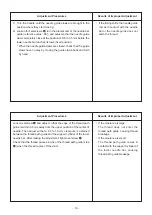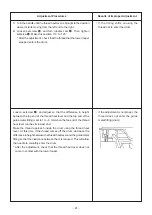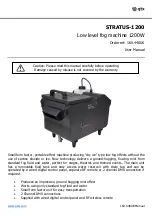
−
31
−
Adjustment Procedures
Results of Improper Adjustment
Adjustment Procedures
Results of Improper Adjustment
1) Turn ON the power to the machine.
2) Maximize the two stitch length adjusting dials on the control panel.
3) Loosen setscrew
A
tp set the lever free. Then adjust so that the
upper feed dog meets the lower feed dog by moving the upper
feed dog back and forth. After the adjustment, tighten setscrew
A
.
The feed mechanism is controlled by a stepping motor, which
means that the feed components cannot be positioned correctly
unless the power to the machine is turned ON.
™
If the adjustment is not proper, the
stitch length will be unstable.
1) To adjust the center of the needle with respect to the throat plate,
loosen four setscrews
A
in the take-up plate first. Then position
the throat plate so that the needle enters the center of the needle
hole in the throat plate. Then tighten setscrews
A
in the take-up
plate.
2) Loosen setscrew
E
in the presser foot holder, and adjust so that
the needle groove in the throat plate is aligned with the slot in the
presser foot. After the adjustment, tighten setscrew
E
.
3) Loosen setscrew
D
, and adjust the relation between the throat
plate and the lower feed dog so that a 0.6
±
0.1 mm clearance, on
the needle center side, is provided between the throat plate and
the lower feed dog. (Refer to the item (12) Adjusting the lower
feed.)
4) Loosen setscrew
D
, and you can move the presser foot back and
forth. Now, align the presser foot with the center of the needle by
moving the presser foot so that the groove in the presser foot is
aligned with the center of the needle.
















































